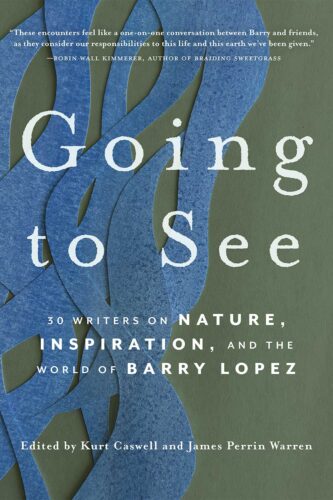
“Much of what I know about integrity, constancy, power and nobility I’ve learned from this river,” author Barry Lopez once wrote of the McKenzie River. He lived in sight of the McKenzie until the area burned in the 2020 Labor Day wildfires; Lopez died in the months after the fires.
Lopez’s home survived, but an outbuilding containing 50 years of his personal journals burned.
Fellow author David James Duncan says not only were the detailed journals lost, but also gifts and memorabilia from Lopez’s travels. “Every one of those priceless journals and gifts were in the archive building obliterated by the 2020 fires,” Duncan says, “leaving Barry feeling, in his own word, that he’d been erased.”
“Given those losses,” Duncan continues, “the book Going to See — comprised as it is of 30 writers portraying the countless ways in which Barry has not been erased — could not be more timely.”
Duncan will speak at the McKenzie River Trust’s “Upstream” fundraiser on April 17 about his novel, Sun House, and about the forthcoming book of essays, Going to See, inspired by Lopez.
Lopez is known by readers around the world for works such as Arctic Dreams and Of Wolves and Men, and known by writers around the world for his mentorship and inspiration. While the documents that contained Lopez’s personal reflections are gone, many more documents showing the intricate web of his connections to other writers who shared his love of place and the environment survive.
Writer Kurt Caswell, who co-edited Going to See, says that in addition to the boxes of correspondence between Lopez and writers like Duncan that survive and are housed at Texas Tech University’s Sowell Collection, Going to See also shows what Lopez would call wisdom in the community, not in the individual. Each of the writers in the volume was a part of the intricate web that Lopez, too, was a part of. Some he mentored; others never met him but were inspired by him.
Caswell teaches at Texas Tech, where Lopez was a visiting scholar from 2003 until his death, and grew up in Lopez’s beloved Cascades. When he was a 12-year-old kid in Blue River — just up the McKenzie from Lopez’s home near Finn Rock — his father gave him a copy of Lopez’s River Notes: the Dance of the Herons. Reading the book about the river where he lived, though he may not have been able to articulate it at the time, set Caswell on his own journey to become an author, something he writes about in Going to See, which will be published May 1.
Going to See, whose name derives from Lopez’s 2020 book Horizon and its chapter “To Go/To See,” features essays from Gretel Ehrlich, Terry Tempest Williams, Lopez’s widow Debra Gwartney and more.
Duncan says that Lopez, “despite his wounds, cultivated and sustained an extraordinary circle of friends, and Going to See teems with that circle’s clear memories and love for one of our country’s most invaluable and unforgettable men.”
Duncan, whose sprawling Northwest novel on fly fishing and so much more, The River Why, is a cult classic, will also speak about Sun House, his first new work of fiction since 1992’s The Brothers K. The epic nearly 800 page Sun House explores the American search for meaning and love.
Some of the more than 30 years Duncan spent between novels were devoted to the environment — working to stop Exxon Mobil’s megaload of tars sands extraction equipment from traveling the roads along Montana’s river corridors and seeking to un-dam rivers.
He says, “Not many people know that 80 percent of the world’s rivers are now dammed — an environmental, cultural, political and species-destroying disaster largely for the benefit of petty dictators and corrupt bureaucracies.” And adds, “I can hardly believe how quickly four out of every five rivers, globally, became a piss warm greenhouse-gas-spewing captive to human greed.”
The writer and activist says he plans to return to the area in April and stay at Lopez’s house, which is leased to McKenzie River Trust, and “see whether I can sense enough of Barry’s long presence there to perhaps complete some task he might like me to address.”